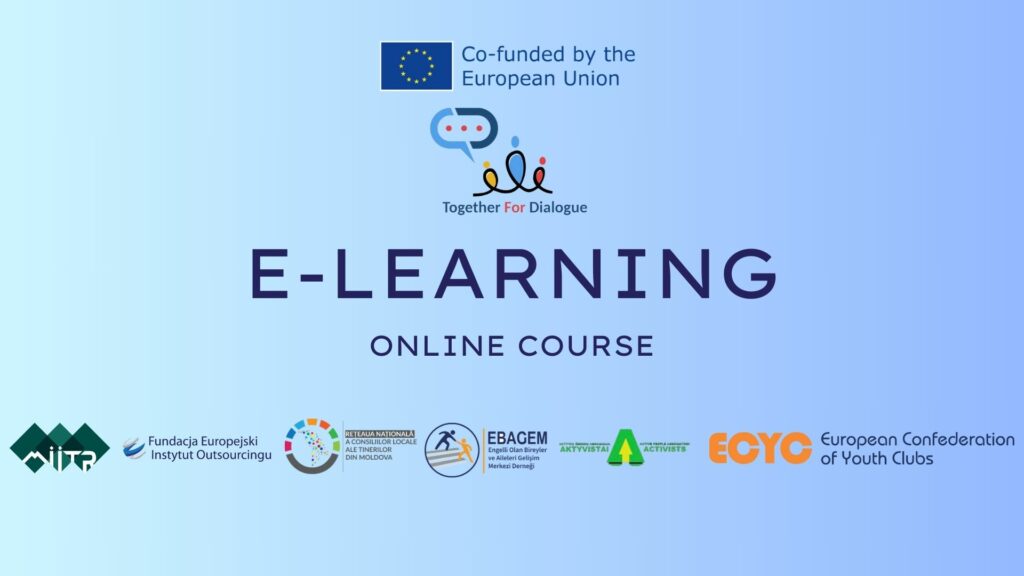
As part of the project, we have developed E-learning (online courses) for young people to help them develop the components of civic competence. This is an innovative format that combines the convenience of distance learning on the Moodle platform and effective experiential learning techniques aimed at acquiring practical skills and knowledge.
The main goal of E-learning is to create conditions to increase the level of civic competence of young people. Through E-learning, young people can prepare themselves for active and informed participation in public life, helping them to better understand their rights and responsibilities, understand and effectively influence social processes.
E-learning includes a set of online courses developed on the basis of experiential learning methodology. This allows not only to study theoretical material, but also to actively participate in its practical application. In the process of learning, course participants perform small assignments, which contributes to a deeper, more practical mastering of the material and its consolidation.
Young people and youth leaders from local communities in the partner countries participated in the process of selecting topics for the E-learning. Also during the youth exchange in Lithuania, the participants supplemented and finalized the topics that were relevant for all project countries together.
As a result we created a set of 10 online courses, which includes a total of 66 parts. Each part of the course consists of a short video, some theory and assignments to be completed to prepare yourself for practical application of the information in real life. And each focusing on different aspects of civic competence and youth engagement. Below is a summary of each course and its lessons:
How to Organize a Local Initiative
- What is a Local Initiative?
- Benefits of Organizing a Local Initiative
- Identifying Community Needs
- Planning Your Local Initiative
- Developing a Detailed Action Plan
- Resource Allocation and Budgeting
- Management of Volunteers
Networking for Youth Civic Activists
- Introduction to Networking
- Power of Networking for Civic Activists
- Identifying and Approaching Potential Network Members
- Building Trust and Rapport
- Mobilizing Your Network for Action
- Collaborating with Network Members
- Enhancing Your Impact through Networking
- Keeping Your Network Engaged
Youth Entrepreneurship: What You Need to Know to Start Your Own Business
- Finding Business Ideas
- Developing Your Idea
- Initial Business Setup
- Brand Building and Marketing
- Motivation through Books and Movies
Active Citizenship
- What Does Active Citizenship Mean?
- What is Active Citizenship?
- What are the Types of Citizenship?
- Elements of Being an Active Citizen
- Active Citizen – Civic Society Relation
- How to Become an Active Citizen
Non-formal Education
- What is the Meaning of Non-formal Education?
- Explanation of Informal, Non-formal, and Formal Education
- Energizers, Ice Breakers, and Team Building Activities
How to Write Projects?
- What is Erasmus+ Program?
- How to Start Writing Erasmus+ Project?
- What Do KA1, KA2, and KA3 Mean?
- 9 Key Steps to Writing a Project
Communication
- Course Introduction
- The Fundamentals of Communication
- Overcoming Communication Barriers
- Techniques for Effective Verbal Communication
- Writing Clearly and Effectively
- The Importance of Active Listening
- Adapting Your Communication to Different Audiences
- Applying Communication Skills in Real-World Scenarios
Youth Participation in Decision-Making Process
- What Means Participation?
- Ladder of Youth Participation
- Benefits and Barriers to Youth Participation
- Principles of Youth Participation
- Forms of Youth Participation
- Cooperation in Decision-Making – Consultation Model
- Cooperation in Decision-Making – Committee Model
- Cooperation in Decision-Making – Co-management
- Other Forms of Cooperation in Decision-Making
Lobby and Advocacy
- Understanding the Difference between Lobbying and Advocacy
- Legal Framework and Regulations
- Building relationships
- Clear and Persuasive Messaging
- Strategic Planning
- Grassroots Mobilization
- Measuring Impact
Media and Information Literacy
- Introduction to Media and information literacy
- Understanding media: Types and characteristics
- Evaluating information sources
- Media ethics and responsibility
- The influence of media on society
- Digital literacy and online safety
- How to apply media literacy skills in the digital age
Video materials additionally we have placed on YouTube platform to spread the information and attract attention to E-learning more and more young people.
The total time to master a set of online courses includes almost 79 hours. On the one hand, this allows you to learn the material quickly enough, and on the other hand, efficiently and in a format that is very familiar to young people.
We invite you to join our E-learning courses and enhance your civic competence.
Click below for instructions on how to register and access the courses: